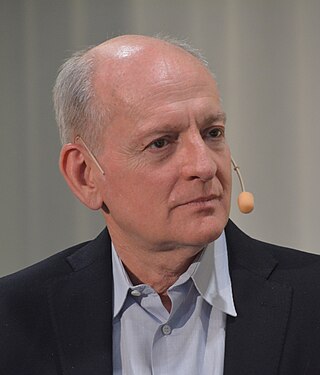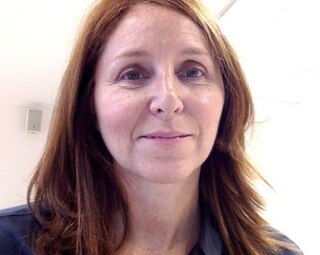
The Association for the Advancement of Artificial Intelligence (AAAI) is an international scientific society devoted to promote research in, and responsible use of, artificial intelligence. AAAI also aims to increase public understanding of artificial intelligence (AI), improve the teaching and training of AI practitioners, and provide guidance for research planners and funders concerning the importance and potential of current AI developments and future directions.

Stuart Jonathan Russell is a British computer scientist known for his contributions to artificial intelligence (AI). He is a professor of computer science at the University of California, Berkeley and was from 2008 to 2011 an adjunct professor of neurological surgery at the University of California, San Francisco. He holds the Smith-Zadeh Chair in Engineering at University of California, Berkeley. He founded and leads the Center for Human-Compatible Artificial Intelligence (CHAI) at UC Berkeley. Russell is the co-author with Peter Norvig of the authoritative textbook of the field of AI: Artificial Intelligence: A Modern Approach used in more than 1,500 universities in 135 countries.

Judea Pearl is an Israeli-American computer scientist and philosopher, best known for championing the probabilistic approach to artificial intelligence and the development of Bayesian networks. He is also credited for developing a theory of causal and counterfactual inference based on structural models. In 2011, the Association for Computing Machinery (ACM) awarded Pearl with the Turing Award, the highest distinction in computer science, "for fundamental contributions to artificial intelligence through the development of a calculus for probabilistic and causal reasoning". He is the author of several books, including the technical Causality: Models, Reasoning and Inference, and The Book of Why, a book on causality aimed at the general public.
Bart Selman is a Dutch-American professor of computer science at Cornell University. He has previously worked at AT&T Bell Laboratories. He is also co-founder and principal investigator of the Center for Human-Compatible Artificial Intelligence (CHAI) at the University of California, Berkeley, led by Berkeley artificial intelligence (AI) expert Stuart J. Russell, and co-chair of the Computing Community Consortium's 20-year roadmap for AI research.
Alan Mackworth is a professor emeritus in the Department of Computer Science at the University of British Columbia. He is known as "The Founding Father" of RoboCup. He is a former president of the Association for the Advancement of Artificial Intelligence (AAAI) and former Canada Research Chair in Artificial Intelligence from 2001–2014.
There are a number of competitions and prizes to promote research in artificial intelligence.

Michael Lederman Littman is a computer scientist, researcher, educator, and author. His research interests focus on reinforcement learning. He is currently a University Professor of Computer Science at Brown University, where he has taught since 2012.

Manuela Maria Veloso is the Head of J.P. Morgan AI Research & Herbert A. Simon University Professor Emeritus in the School of Computer Science at Carnegie Mellon University, where she was previously Head of the Machine Learning Department. She served as president of Association for the Advancement of Artificial Intelligence (AAAI) until 2014, and the co-founder and a Past President of the RoboCup Federation. She is a fellow of AAAI, Institute of Electrical and Electronics Engineers (IEEE), American Association for the Advancement of Science (AAAS), and Association for Computing Machinery (ACM). She is an international expert in artificial intelligence and robotics.

Eric Joel Horvitz is an American computer scientist, and Technical Fellow at Microsoft, where he serves as the company's first Chief Scientific Officer. He was previously the director of Microsoft Research Labs, including research centers in Redmond, WA, Cambridge, MA, New York, NY, Montreal, Canada, Cambridge, UK, and Bangalore, India.
William Eric Leifur Grimson is a Canadian-born computer scientist and professor at the Massachusetts Institute of Technology, where he served as Chancellor from 2011 to 2014. An expert in computer vision, he headed MIT's Department of Electrical Engineering and Computer Science from 2005 to 2011 and currently serves as its Chancellor for Academic Advancement.
Fellowship of the Association for the Advancement of Artificial Intelligence is an award granted to individuals that the Association for the Advancement of Artificial Intelligence (AAAI), judged to have made "significant, sustained contributions — usually over at least a ten-year period — to the field of artificial intelligence" (AI). Only a small percentage of members are nominated Fellows of the AAAI.

Peter Stone is an American computer scientist who is the David Bruton Jr. Centennial Professor of Computer Science at the University of Texas at Austin. He is also an Alfred P. Sloan Research Fellow, Guggenheim Fellow, AAAI Fellow, and Fulbright Scholar.

Francesca Rossi is an Italian computer scientist, currently working at the IBM Thomas J. Watson Research Center as an IBM Fellow and the IBM AI Ethics Global Leader.
Maria Gini is an Italian and American Computer Scientist in artificial intelligence and robotics. She has considerable service to the computer science artificial intelligence community and for broadening participation in computing. She was Chair of the ACM Special Interest Group in Artificial Intelligence SIGAI from 2003 to 2010. She is currently a member of the CRA-W board.

Rina Dechter is a distinguished professor of computer science in the Donald Bren School of Information and Computer Sciences at the University of California, Irvine. Her research is on automated reasoning in artificial intelligence focusing on probabilistic and constraint-based reasoning. In 2013, she was elected a Fellow of the Association for Computing Machinery.

Carla Pedro Gomes is a Portuguese-American computer scientist and professor at Cornell University. She is the founding Director of the Institute for Computational Sustainability and is noted for her pioneering work in developing computational methods to address challenges in sustainability. She has conducted research in a variety of areas of artificial intelligence and computer science, including constraint reasoning, mathematical optimization, and randomization techniques for exact search methods, algorithm selection, multi-agent systems, and game theory. Her work in computational sustainability includes ecological conservation, rural resource mapping, and pattern recognition for material science.

Mary-Anne Williams FTSE is the Michael J Crouch Chair for Innovation at the University of New South Wales in Sydney Australia (UNSW) based in the UNSW Business School.
Pascal Van Hentenryck is the A. Russell Chandler III Chair and Professor of Industrial and Systems Engineering at Georgia Tech. He is credited with pioneering advances in constraint programming and stochastic optimization, bridging theory and practice to solve real-world problems across a range of domains including sports scheduling, protein folding, kidney matching, disaster relief, power systems, recommender systems, and transportation. He has developed several optimization technologies including CHIP, Numerica, the Optimization Programming Language, and Comet. He has also published several books, including Online Stochastic Combinatorial Optimization, Hybrid Optimization, and Constraint-Based Local Search.

Kenneth M. Ford is an American computer scientist who is the chief executive officer of the Florida Institute for Human and Machine Cognition (IHMC), a research center affiliated with the State University System of Florida. He resides in Pensacola, Florida, with his wife Nancy.
Sylvie Thiébaux is a French-Australian computer scientist, whose research in artificial intelligence focuses on automated planning and scheduling, diagnosis, and automated reasoning under uncertainty. She is a professor of computer science at the Australian National University, and co-editor-in-chief of the journal Artificial Intelligence.












